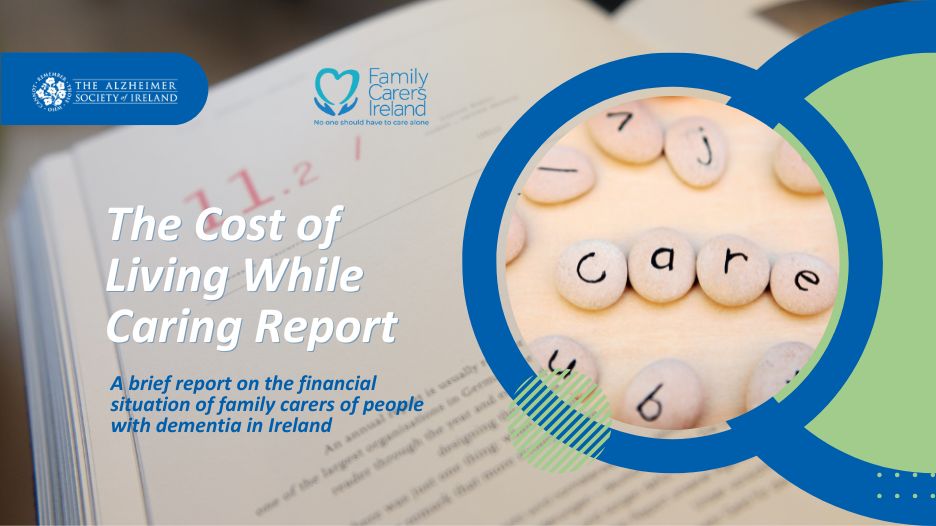Current Campaigns

The Cost of Living While Caring Report | A brief report on the financial situation of family carers of people with dementia in Ireland
People affected by dementia are being hit particularly hard by the cost of living crisis, a new report released by The Alzheimer of Ireland (The ASI) shows.
The Cost of Living While Caring: A brief report on the financial situation of family carers of people with dementia in Ireland, highlighting significant financial challenges faced by family carers of people with dementia. This publication results from a collaboration between The ASI and Family Carers Ireland (FCI). It follows an analysis of feedback provided by family carers of people with dementia surveyed as part of FCI’s The State of Caring 2022 report.
Over 180,000 people in Ireland are or have been carers for a family member or partner with dementia, with many more providing support and care in other ways.
The ASI is aware that people affected by dementia are struggling financially. Calls to The ASI National Helpline regarding financial matters have increased, and our team throughout the country is hearing from family carers about their worsening financial situation.
The Cost of Living While Caring report highlights the financial challenges faced by 129 family carers of people with dementia and is based on anonymised dementia-specific data collected by Family Carers Ireland as part of The State of Caring 2022 report.
Clodagh Whelan, Advocacy Manager at The ASI, said: “Family carers of people living with dementia are at the frontline of dementia care in Ireland. They make huge personal sacrifices to ensure their loved one is safe and looked after. What we are hearing from those families is that their situation and stress is made worse by financial concerns. We at The ASI are particularly concerned to learn that families affected by dementia are cutting back on social opportunities for financial reasons because we know dementia can be a lonely and isolating disease. We are publishing this report today to amplify the experience of people affected by dementia throughout Ireland, to say we hear you, and we know you are struggling. We also publish this report to outline several measures that the Government could take to support those families. While the data is from 2022, our engagement with people affected by dementia in 2023 continues to paint a stark and worsening picture of their financial situation.”
Dr Laura O’Philbin, Research & Policy Manager at The ASI, said: “This Irish data, published in collaboration with Family Carers Ireland, clearly points to significant financial challenges experienced by family carers of people with dementia as they contend with the cost of living crisis. National and international data show that family carers (generally women) of people living with dementia have poor health outcomes such as stress, burnout and illness. Research undertaken by The Alzheimer Society of Ireland throughout Covid-19 highlighted the profound impact of public health measures and the closure of services on family carers’ mental and physical health. Having to make cutbacks due to the cost of living crisis combined with already challenging caring roles has the potential to create another extremely difficult and arduous situation for family carers of people with dementia.”
The Irish health and social care system depends on family carers who provide the lion’s share of care to people with dementia. The value of this work to the State is estimated to be in the region of €804m per annum*.
The report provides a picture of the costs of caring in Ireland in 2022 for family carers of people living with dementia.
- 55% of carers said they have difficulty making ends meet. Notably, 12% (n=15) of family carers state they have great difficulty making ends meet.
- 17.8% of family carers stated that they were cutting back on household essentials.
- 22.5% have cut back on seeing friends and family.
- In some cases, financial difficulties were so impactful that people had fallen into arrears with mortgage payments (4.7%) and utility bills (5.4%).
The ASI calls on the Government to introduce the following measures to support family carers:
- Include Carer’s Allowance as a qualifying payment for Fuel Allowance to support the rising cost of fuel and household bills and increase the capital disregard for those under 70 to €50k in line with the disregard for persons over 70.
- Increase the weekly rate of the Carer’s Allowance to support people affected by dementia adequately. The once-off payments allocated in Budget 2023 are welcome, but the weekly rate remains insufficient to meet the needs of struggling carers.
- The €200 cost of living lump sum due to be paid to long-term social welfare recipients in April 2023 should include carers who receive the annual Carer’s Support Grant as a standalone payment, as was the case with the cost of living payments in November 2022.
- Recognise the costs of caring in the allowable deductions for Carer’s Allowance, including medical expenses and fuel, and assess income on net value.
Dr Nikki Dunne, Research Manager, Family Carers Ireland said: “The fact that a majority of family carers are having difficulty making ends meet clearly shows that existing financial supports are inadequate. Amid a worsening cost of living crisis, the situation is sadly becoming bleaker. It is not good enough that many family carers receive payments which fall well short of the established minimum essential standard of living (MESL). Approximately 1 in 8 recipients of Carer’s Allowance receive a reduced rate while thousands of full-time family carers are excluded from the scheme entirely due to their means. The Government must urgently reform the Carer’s Allowance scheme to address the hardship that so many families are experiencing.”
You can download the full report at this link.
